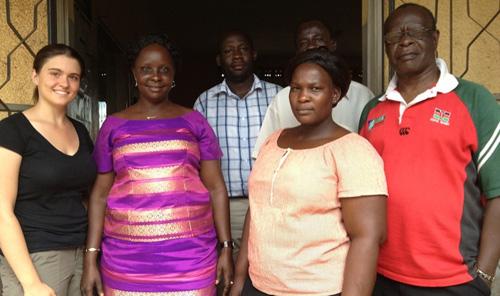
Dr. Nicole Sirotin
Nicole Sirotin, M.D. (co-PI, WCMC) and Sera Young, Ph.D. (PI, Cornell University, College of Human Ecology, Division of Nutritional Sciences) were granted an intercampus collaborative research grant. The project characterizes food insecurity in HIV-infected and -uninfected lactating women. Specifically, it is evaluating the relationship between food insecurity and maternal B12 and foliate levels, maternal depression and infant feeding practices.
Dr. Sirotin and Dr. Young formed a partnership in this research effort after Dr. Sirotin was invited to Cornell University's Division of Nutritional Sciences to speak on food insecurity and women's empowerment. At the time, Dr. Sirotin had been working on these areas with colleagues from UCSF and the World Food Program and International Food Policy Research Institute (IFPRI). The current research collaboration that Drs. Sirotin and Young are implementing extends a K-01 funded study of Dr. Young's called, "Pre-NAPS" (Prenatal Nutrition And Psychosocial Health Outcomes Study), which follows HIV-infected and HIV-negative women throughout pregnancy while measuring food insecurity, nutritional deficiencies and depression. The Cornell University-Weill Cornell Medical College (CU-WCMC) seed grant allowed for the extension of this study to one year post-partum. "Post-NAPS" is a partnership between Weill Cornell Medical College, Cornell University, Gulu University in Gulu, Uganda and a Uganda-based NGO, entitled "Pre-NAPS-Uganda: Promoting Research and Extension on Nutrition and HIV/AIDS in Primary-care Settings in Uganda."

Members of the new study*
Drs. Sirotin and Young are unaware of any diagnostic screening tool that can indicate which lactating women are at greater risk of adverse nutritional (e.g. micronutrient deficiencies) or psychosocial (e.g. depression) outcomes, or which infants are at greater risk of sub-optimal infant feeding in Sub-Saharan Africa. Yet the irreversibility of poor health in "the first 1000 days" of life mean that it is essential to find cheap, effective screening tools to detect mothers and infants at greatest risk of adverse outcomes in order to target available resources (e.g. supplements, infant feeding counseling) to those in greatest need. Post-NAPS will directly address these questions with the generous support of the CU-WCMC Seed Grant.

Study staff with Angela Arbach
The Dr. Sirotin-Dr. Young partnership is providing bi-national research opportunities for both CU and WCMC students and will shed light on important questions about food insecurity during a critical time for both women and infants. Knowledge from this study will better inform screening programs for lactating women, directed at preventing poor nutritional and psychological outcomes during the critical "first 1000 days" of an infant's life. As an internist, Dr. Sirotin cares for a diverse group of patients, many of whom are lactating women, in a community-based practice at the Long Island City Health Center, a federally qualified health center that is part of the Community HealthCare Network. This study will help her to identify and screen at-risk women in her own practice, as well as advance discoveries for the scientific and public health community.
An Assistant Professor of Medicine in the Department of Medicine, Dr. Sirotin practices, and serves as a resident supervisor, at the Long Island City Health Center, which is one of the three clinical sites of Weill Cornell Internal Medicine Associates (WCIMA). She created the Vulnerable and Immigrant Populations Curriculum, a longitudinal health disparities course for the residency program, and currently serves as a Medical Director of the student-run Weill Cornell Center for Human Rights. She also serves as a volunteer for both Physicians for Human Rights Asylum Network and the HealthRight International volunteer network, conducting medical evaluations of asylum seekers since 2008. Dr. Sirotin routinely leads trainings for medical students, physicians, and lawyers in issues of health and human rights.
*Members of the new intercampus collaborative study include: Mr. Barnabas Natamba, doctoral candidate at Cornell University's Division of Nutritional Sciences, who serves as the study coordinator. Prior to joining Cornell University, Mr. Natamba worked for two years as a Lecturer in the Department of Public Health of Gulu University. He holds a Master's degree in Public Health from the Braun School of Public Health and Community Medicine at the Hebrew University of Jerusalem and a Bachelor's degree in Food Science and Technology from Makerere University in Kampala. Angela Arbach, WCMC Class of 2014, recently returned from spending six months in Gulu assisting with the project (co-mentored by Drs. Sirotin and Young).

